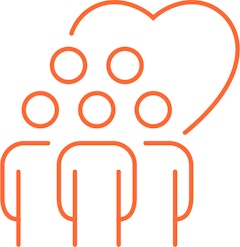Our words matter: Guidelines for language use
The way we communicate about mental health and wellbeing, mental health concerns, suicide, and alcohol and other drugs (AOD) can have either a positive or negative impact on a person’s life. The words we choose to use can make all the difference.
Our words matter: Guidelines for language use is a practical, research-informed, and user-friendly resource that is designed for media, researchers, service providers and other communicators. It seeks to inform, support and empower people to select and use words in ways that minimise stigma and harm and maximise diversity of representation.
Incorporating these guidelines into practice will help to educate the public, break down misinformation and promote help-seeking, and help-offering behaviour.
This new resource was funded by the National Mental Health Commission and developed in consultation with a diverse range of stakeholders in Australia.

Use language that empowers and reflects people's lived and living experiences
Sharing stories of people with a lived or living experience can be powerful.

Adapt language to suit preferences and audience
The words we use are more likely to connect and engage with people when they reflect the preferences and needs of the audience.

Use language that is understandable
To increase understanding, we should use language that is non-judgemental and non stigmatising, and avoid terms that may not be known or are confusing to a broader audience.

Avoid language that is sensationalised, including in headlines and titles
Language should help inform rather than alarm people. While elements of communication such as headlines or titles are designed to gain attention and encourage audiences to click-through or read further, engagement is not an excuse for sensationalised or alarming language.

Consider the language you use and ensure it is appropriate for specific contexts
Context matters. When communicating about these experiences, we need to consider the contexts in which words are used and the ways in which they may affect identity, understanding, attitudes or behaviours.
View and download Our words matter: Guidelines for language use
Supporting resources
A range of resources to support implementation of the guidelines have been developed, including:
Our words matter: Glossary of terms
The Our words matter: Glossary of terms was developed to be used in tandem with the Our words matter: Guidelines for language use.
It is recommended that they be referenced when communicating about complex topics such as mental health and wellbeing, mental health concerns, self-harm, suicide, eating disorders and alcohol and other drugs (AOD), the preferred terms to choose, and the context to use them in.
The glossary contains terms that are currently in use as well as terms that are emerging as preferred language, with common definitions, alternative terms and some guidance on how to use the terms in context.
Our words matter quick reference guides
Quick reference summaries of the guidelines tailored to support researchers and service providers when considering the impacts of the words they choose.
Our words matter checklist
The Our words matter checklist was developed to make language selection simpler, when communicating about mental health and wellbeing, mental health concerns, suicide and self-harm, disordered eating, and AOD.

Missed the webinar launch of these new guidelines?
View the full webinar launch hosted by Sophie Scott.
FAQ
A number of questions were submitted during the live webinar launch of the guidelines and resources. Everymind has provided responses below to queries that were not specifically addressed on the day.
Q: Do I have permission to download and distribute this document to my clients?
A: Yes! The language guidelines and all supporting resources can be downloaded and distributed to anyone you would like to share them with.
Q: How do we get psychiatrists and mental health specialists to change their language? The language used in these fields is often very stigmatising and judgemental.
A: We are encouraging all service providers to engage with the guidelines and to promote inclusive language in their practice. We have also created a quick reference guide for service providers to support their language choices and provide alternatives to stigmatising phrases. The quick reference guide for service providers can be found above on this page.
Q: The phrases 'trauma informed care', 'person centred', 'recovery orientated' are thrown around so often and can be tokenistic. How do we ensure that this guideline does not become tokenistic?
A: We acknowledge that language is constantly evolving and changing. We will continually seek feedback and update the guidelines and supporting resources where necessary. We will also continue to promote and disseminate these guidelines to encourage meaningful change across various sectors.
Q: What about when people take back formerly stigmatising words e.g. Mad Studies
A: We recommend referring back to an individual’s or audience’s preferences and consider the context that it is shared in.
Q: How about the idea of a 'euphemism treadmill'? No matter how many times you update language or terms for a concept, these resources may not change anything until we address the root cause: attitudes (e.g. racism, sexism)
A: We acknowledge that language is consistently evolving and language preferences are personal. We recommend referring to an individual or audiences preferences and consider the context which it is being shared. The key principles of the guidelines are “do no harm”, “aim to do good” and “stay curious and open to change”. We intend for these guidelines to be updated as language evolves and will continue to work with various stakeholders, including people with lived and living experience, to inform these updates.
Q: How we can get people to differentiate self-harm from suicide attempts (i.e using the term self-injury)? The terms are commonly thrown together but are very separate acts with different intent.
A: As language evolves we will be updating the glossary of terms to reflect language preferences. On our next glossary update we will aim to address these different terms and support people to make informed language choices. Thank you for highlighting this.
Q: Do you have social media tiles to promote Our words matter? Do you have other resources other than the guidelines on the website?
A: On this page, above this FAQ section, you will find the guidelines, the glossary of terms, the quick reference cards for service providers and researchers and guidance cards for specific topics.
Please download and share the social media tiles below and link to this page using the URL: tinyurl.com/Ourwordsmatter
Q: Will these guidelines and resources be imbedded in learning within schools and community minded learning hubs so it can be relatable for everyone from young people to mature aged-students and drawn on as a holistic priority by all communities?
A: The guidelines and resources are available for all people to access and embed in their own practice. We will be running open online training sessions for all people to attend, including any community groups and youth hubs that are interested in registering. Information about training sessions can be found here: Online training sessions - Mindframe
Q: What’s the origin of the term ‘living experience’ and how is it different to ‘lived experience’?
Lived and living experience is the preferred term that emerged from our research with stakeholders. ‘Living experience’ may be preferred by some people to indicate that the personal experience is current and not in the past.
Q: I am interested to hear the panel's thoughts on the language ‘suicide attempt’. It doesn’t sit well with me personally. I opt for ‘non-fatal suicide’ but I would like to know about other language options.
A: We acknowledge that everyone has their own language preferences and these need to be acknowledged and supported. We recommend referring back to the individual's or audience's language preferences when choosing language to discuss this topic area.
Q: Will there be a guidance card or resource specifically for speaking about people with lived and living experience of borderline personality disorder?
A: We encourage people to follow the key principles of the language guidelines when discussing anyone who has a lived and living experience of mental health concerns. We have also created a quick reference guide for service providers which provides support for reframing commonly used language that can perpetuate stigma of people’s experiences.
Q: Are we able to download the animation video we saw earlier?
A: The animation video is available to view at the top of this page.
It can be can also be downloaded or shared using this URL: https://vimeo.com/819704110
Q: How do these new guidelines compliment/replace the National communications charter?
The National communications charter (the Charter) sets out seven principles to guide communication about mental health concerns and suicide. Examples of the principles include making mental health, wellbeing and suicide a national priority, respecting the diversity of experience, and using appropriate, respectful and person-centred language in all communication. Using the guidance provided by Our Words Matter is consistent with the Charter’s principles, and can be considered a way of actioning The Charter.
Q: I'm curious as to why the term 'mental illness' has been chosen. I thought 'mental ill-health' was increasingly the preferred term.
A: Mental ill-health is an umbrella term often used in policy documents and prevention work to describe both mental health concerns and mental illness.
Mental illness is the most commonly used term to describe conditions diagnosed by a medical professional that significantly affect how a person thinks, feels and interacts with other people.
For more information please visit the glossary of terms on the Mindframe website: Glossary of terms - Mindframe
Q: Grammar checking (AI) apps are increasingly popular. Has Mindframe reached out to any software developers to include the preferred and alternative terminologies in their algorithms?
A: Currently, Mindframe is not partnered with any AI developers.
Q: Are the images we can download from the Mindframe Images website royalty-free and able to be used in social media?
A: Yes the images from the images library are able to be shared across all platforms.
Learn more and access the free image library, Images matter guidelines and other supporting resources for image use by clicking here.
Q: A lot of problematic language originates in the legal sector before being spread further by media. Is there a way we could look to implement these guidelines in this sector?
A: The Mindframe guidance page for court reporting which can be found here.
We are also currently developing a quick reference guide for court reporting which will be accessible from the Mindframe website upon release.
Are you an Australian media professional?
Sign up to receive Mindframe Media Alerts to support safe reporting.











